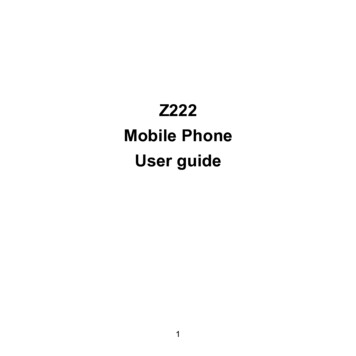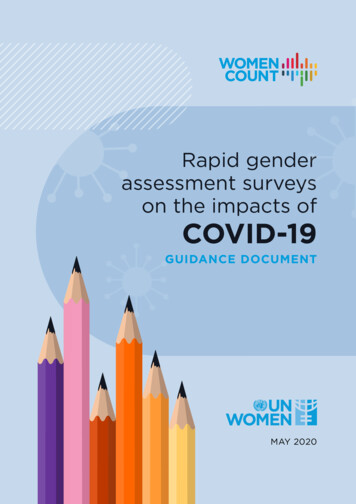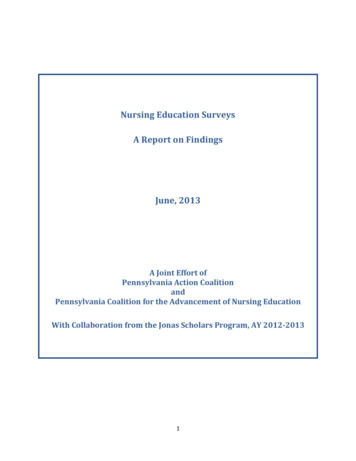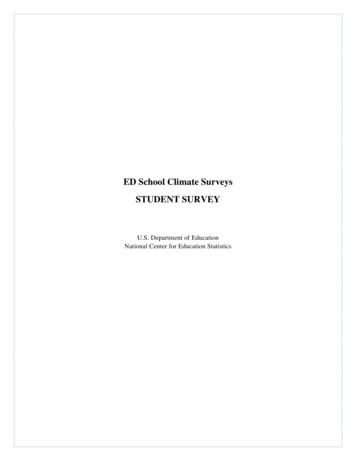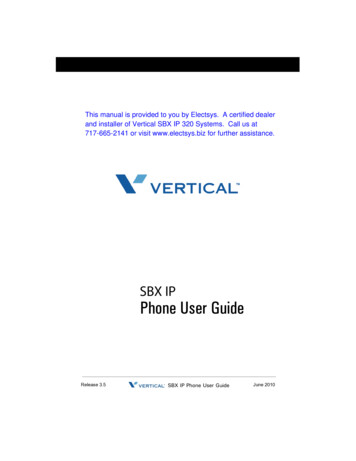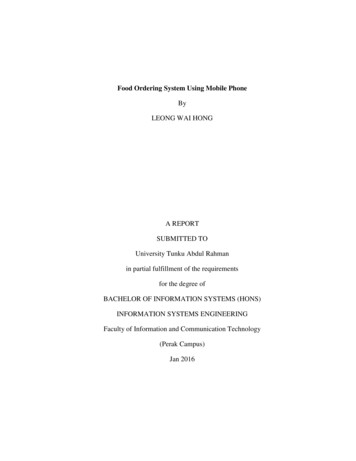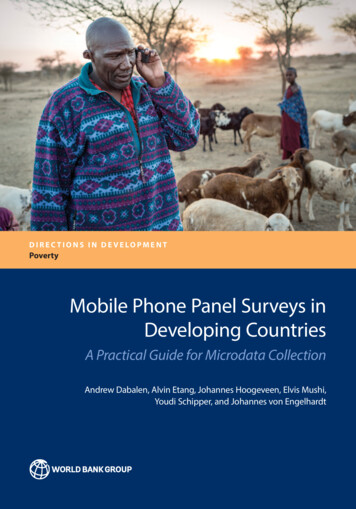
Transcription
DIREC TIONS IN DE VELOPMENTPovertyMobile Phone Panel Surveys inDeveloping CountriesA Practical Guide for Microdata CollectionAndrew Dabalen, Alvin Etang, Johannes Hoogeveen, Elvis Mushi,Youdi Schipper, and Johannes von Engelhardt
Mobile Phone Panel Surveys in Developing Countries
Direc tions In De velopmentPovertyMobile Phone Panel Surveys inDeveloping CountriesA Practical Guide for Microdata CollectionAndrew Dabalen, Alvin Etang, Johannes Hoogeveen,Elvis Mushi, Youdi Schipper, and Johannes von Engelhardt
2016 International Bank for Reconstruction and Development / The World Bank1818 H Street NW, Washington, DC 20433Telephone: 202-473-1000; Internet: www.worldbank.orgSome rights reserved1 2 3 4 19 18 17 16This work is a product of the staff of The World Bank with external contributions. The findings, interpretations, and conclusions expressed in this work do not necessarily reflect the views of The World Bank, itsBoard of Executive Directors, or the governments they represent. The World Bank does not guarantee theaccuracy of the data included in this work. The boundaries, colors, denominations, and other informationshown on any map in this work do not imply any judgment on the part of The World Bank concerning thelegal status of any territory or the endorsement or acceptance of such boundaries.Nothing herein shall constitute or be considered to be a limitation upon or waiver of the privileges andimmunities of The World Bank, all of which are specifically reserved.Rights and PermissionsThis work is available under the Creative Commons Attribution 3.0 IGO license (CC BY 3.0 IGO) http://creativecommons.org/licenses/by/3.0/igo. Under the Creative Commons Attribution license, you are free tocopy, distribute, transmit, and adapt this work, including for commercial purposes, under the followingconditions:Attribution—Please cite the work as follows: Dabalen, Andrew, Alvin Etang, Johannes Hoogeveen, ElvisMushi, Youdi Schipper, and Johannes von Engelhardt. 2016. Mobile Phone Panel Surveys in DevelopingCountries: A Practical Guide for Microdata Collection. Directions in Development. Washington, DC:World Bank. doi:10.1596/978-1-4648-0904-0. License: Creative Commons Attribution CC BY 3.0 IGOTranslations—If you create a translation of this work, please add the following disclaimer along with theattribution: This translation was not created by The World Bank and should not be considered an officialWorld Bank translation. The World Bank shall not be liable for any content or error in this translation.Adaptations—If you create an adaptation of this work, please add the following disclaimer along with theattribution: This is an adaptation of an original work by The World Bank. Views and opinions expressed inthe adaptation are the sole responsibility of the author or authors of the adaptation and are not endorsed byThe World Bank.Third-party content—The World Bank does not necessarily own each component of the content containedwithin the work. The World Bank therefore does not warrant that the use of any third-party-ownedindividual component or part contained in the work will not infringe on the rights of those third parties. The risk of claims resulting from such infringement rests solely with you. If you wish to re-usea component of the work, it is your responsibility to determine whether permission is needed for thatre-use and to obtain permission from the copyright owner. Examples of components can include, butare not limited to, tables, figures, or images.All queries on rights and licenses should be addressed to the Publishing and Knowledge Division, TheWorld Bank, 1818 H Street NW, Washington, DC 20433, USA; fax: 202-522-2625; e-mail: pubrights @ worldbank.org.ISBN (paper): 978-1-4648-0904-0ISBN (electronic): 978-1-4648-0905-7DOI: 10.1596/978-1-4648-0904-0Cover photo: Sven Torfinn / Panos Pictures. Used with the permission of Sven Torfinn / Panos Pictures.Further permission required for reuse.Cover design: Naylor Design.Library of Congress Cataloging-in-Publication Data has been requested.Mobile Phone Panel Surveys in Developing Countries http://dx.doi.org/10.1596/978-1-4648-0904-0
ContentsForewordAcknowledgmentsAbout the Authors and ContributorsAbbreviationsChapter 1Chapter 2Chapter 3ixxixiiixviiIntroduction1The Rationale for Mobile Phone Panel SurveysWhy Mobile Phone Panel Surveys?The MPPS ApproachAdvantages of MPPSsInquiry on Mobile Data Collection: Voice and theAlternativesSteps in Conducting Representative MPPSsNotesReferences33458101213Designing a Mobile Phone Panel SurveyIntroductionCross-Section or Panel Design?The Implications of Frequency and Duration forData Quality and BiasRespondent SelectionSampling FramesMPPS-Specific ChallengesSample Size CalculationStratification and ClusteringSample Weights and ReweightingNotesReferences151516The Baseline SurveyIntroductionGroundwork: The Distribution of Mobile Phonesand Solar Chargers333316181821242627303133Mobile Phone Panel Surveys in Developing Countries http://dx.doi.org/10.1596/978-1-4648-0904-0v
viContentsConsiderations in Purchasing Mobile Phones andSolar ChargersHandling the Registration of SIM CardsChoosing the Mode of Data Collection during theBaseline SurveyObtaining Official Licensing for the SurveyMPPS Instruments: The Baseline SurveyPiloting an MPPSBuilding Team Spirit and Community EngagementChallenges Associated with the MPPS Baseline SurveyNotesReferences34353638384141424444Chapter 4Setting Up a Call CenterIntroductionBuilding an In-House Call Center vs. OutsourcingTechnology ConsiderationsThe Recruitment and Training of Call Center StaffIncentives and Other ConsiderationsQuality Control MeasuresNotesReferences454545464850515252Chapter 5Conducting Mobile Phone Panel InterviewsIntroductionNonresponse, Attrition, and the Survey ParticipationDecisionRespondent Decisions to ParticipateThe Mobile Phone Survey QuestionnaireDuration and Frequency of Mobile Phone SurveysReview, Translation, Pretest, Scripting, Training, andPilotingData CollectionResponse Correlates and the Effect of IncentivesAttrition Management: A ReviewNotesReferences5353606167697171Data Analysis and ManagementIntroductionData AnalysisReport WritingData DisseminationThe Open Data Principle737373757677Chapter 653545659Mobile Phone Panel Surveys in Developing Countries http://dx.doi.org/10.1596/978-1-4648-0904-0
viiContentsChapter 7How Much Does It Cost?79Appendix AHead of Household Consent Form83Appendix BRespondent Agreement Form87Appendix CBaseline Survey Checklist89Appendix DSample Mobile Phone Questionnaire91Appendix ESample Phone Survey Round Calendar95Appendix FSauti za Wananchi Report 9 (March 2014)97Appendix GChecklist of Budget Items for MPPSs107Boxes1.12.12.23.13.24.14.24.3Mobile Phone–Based Modes of Data CollectionAdministrative Lists as Sampling FramesStata Code for Weight CalculationsTanzania Mobile Phone SurveyIntrahousehold Conflict and the Head of HouseholdConsent FormThe Number of Call Center InterviewersSpecial Considerations in Hiring Call Center InterviewersDynamic 5.56.1Household Mobile Phone Ownership, by Wealth Quintile,2010–12Response Rates, Listening to Madagascar, Rounds 1–18, 2014–16Completed Interviews, by Day, 2013 Sauti za Wananchi Survey,Round 12014 Sauti za Wananchi Survey, Interviewers: How Did YouReach the Respondent?2014 Sauti za Wananchi Survey, Interviewers: How Many TimesDid You Call This Respondent?Respondents Who Were Traced, 2014 Sauti za Wananchi Survey,Interviewers: Why Was Reaching the Respondent Difficult?Tracing Strategies Used to Reach Respondents, 2014 Sauti zaWananchi SurveyIn the Past Seven Days, Have You Worried Your HouseholdWould Not Have Sufficient Food?3437626465656674Mobile Phone Panel Surveys in Developing Countries http://dx.doi.org/10.1596/978-1-4648-0904-0
n Was the Last Time Money or Anything of Value WasStolen from You?Experienced Theft in the HomeWhen Was the Last Time You or Your Household MemberObserved Violence in Public?Number of Police Officers in a Village/StreetDo You Know the Police and Fire Emergency Numbers?If You Were a Victim of Crime in This Country, Who, IfAnyone, Would You Go to First for Assistance?What Do You Think Is the Main Reason Many People Do NotReport Crimes Such as Thefts or Attacks to the PoliceWhen They Occur?Who Perpetrates Violence?If the Following Person Steals or Commits Any Other Crime,Will He or She Be Punished According to the Law?Over the Past Year, How Often, If Ever, Have You BeenAfraid or Felt Unsafe?During the Last General Election, Did You Fear Becoming aVictim of Political 15.15.25.36.17.17.2Baseline Survey Variables Typically Used for ReweightingProceduresPros and Cons of Building or Outsourcing a Call CenterEffect of Various Variables on Phone Survey Response RatesAttrition Management, Phase 1: Baseline SurveyAttrition Management, Phase 2: MPPSPlatforms Containing Data and Documentation on MPPSsCost of Conducting a Mobile Phone Panel Survey, FourSample CountriesCost Comparison, an MPPS and an LSMS ComplexMultitopic Survey, Malawi2946676970778181Mobile Phone Panel Surveys in Developing Countries http://dx.doi.org/10.1596/978-1-4648-0904-0
ForewordPoverty must be quantified before it can be defeated. Over the past two decades,considerable progress has been made in measuring the welfare of populationsin developing countries. While traditional welfare surveys will continue to bethe cornerstone for measuring poverty and related aspects of household welfare,these surveys are less suited for monitoring rapidly changing conditions.Yet, decision makers increasingly demand to be informed on a timely basis, particularly at times of crisis. The ability to gather real-time data on living conditions to identify, for instance, the first signs of food shortage could help monitorand assess the impact of a food crisis. It could also facilitate more effective andtargeted interventions.The proliferation of mobile phone networks and inexpensive handsets hasopened new possibilities to collect data with high frequency. Initiatives such asthe World Bank’s Listening to Africa have exploited these new opportunities.Over the past couple of years, various Bank and non-Bank teams have successfully tested approaches to collect reliable and representative welfare data usingmobile phone surveys. Mobile phone surveys have been fielded in a range ofcountries, including Tanzania, Madagascar, Togo, Malawi, and Senegal. At times,these surveys were fielded under the most challenging of circumstances, as wasthe case during the Ebola outbreak in Sierra Leone and the security crisis inNorthern Mali. In all instances, reliable and representative data were obtained, ata reasonable cost.This book, Mobile Phone Panel Surveys in Developing Countries: A PracticalGuide for Microdata Collection, reflects practical lessons from these efforts. It willbe of great relevance to those considering collecting representative data usingmobile phones themselves. This is a new frontier in statistical development. Themobile revolution is changing the way we work. For the better.Makhtar DiopVice President, Africa RegionThe World BankMobile Phone Panel Surveys in Developing Countries http://dx.doi.org/10.1596/978-1-4648-0904-0ix
AcknowledgmentsThis study has been conducted as a joint effort between the Poverty and EquityGlobal Practice–Africa Region of the World Bank and Twaweza. The handbookis authored by Andrew Dabalen (Lead Economist, Poverty and EquityGlobal Practice), Alvin Etang (Economist, Poverty and Equity Global Practice),Johannes Hoogeveen (Lead Economist, Poverty and Equity Global Practice),Elvis Mushi (former Research Manager, Twaweza), Youdi Schipper (Manager,KiuFunza Randomized Evaluation, Twaweza), and Johannes von Engelhardt(Erasmus University of Rotterdam). It has also benefited from contributions ofFelicien Accrombessy (Senior Economist/Statistician, Poverty and Equity GlobalPractice), Kristen Himelein (Senior Economist/Statistician, Poverty and EquityGlobal Practice), Sterling Roop (International Law and Policy Institute), andKeith Weghorst (Vanderbilt University).The authors acknowledge Kathleen Beegle and Nobuo Yoshida for theirextensive comments as peer reviewers at the decision meeting chaired by PunamChuhan-Pole (Lead Economist, Africa Regional Office of the Chief Economist).The handbook also benefited from helpful suggestions from numerous individuals outside the World Bank. In particular, acknowledgments are due to BrianDillon (Assistant Professor, Evans School of Public Policy and Governance,University of Washington), Deborah Johnston (Head of Department, School ofOriental and African Studies, University of London), and the Twaweza teamled by Aidan Eyakuze (Executive Director), particularly Melania Omengo,John Mugo, Nellin Njovu, Sana Jaffer, and Victor Rateng. The authors are gratefulfor the support and guidance of Pablo Fajnzylber (Practice Manager, Poverty andEquity Global Practice). Finally, the team is grateful to partners in implementingcountries for sharing their experiences, especially the national statistical offices ofMadagascar, Malawi, Senegal, and Togo, Human Network International, GISSE(Mali), and Ipsos Synovate (Tanzania).The handbook is a key output of the World Bank’s Listening to AfricaInitiative (that is, mobile phone panel surveys), which was launched in 2012. Thework program, including this study, has been financed through grants from theStatistics for Results Facility Trust Fund, the Umbrella Facility for GenderEquality Trust Fund on Gender-Informed Mobile Phone Surveys in Africa, andthe BNP Paribas Trust Fund on Growth and Equity: Welfare and ServicesMonitoring across Sub-Saharan Africa via Mobile Phone Surveys.Mobile Phone Panel Surveys in Developing Countries http://dx.doi.org/10.1596/978-1-4648-0904-0xi
About the Authors and ContributorsAndrew Dabalen is a Lead Economist in the Poverty and Equity Global Practiceat the World Bank. He focuses on policy analysis and research on developmentissues such as poverty and social impact analysis, inequality of opportunity, program evaluation, risk and vulnerability, labor markets, and conflict and welfareoutcomes. He has worked in the World Bank’s Sub-Saharan Africa and Europeand Central Asia Regions. He has coauthored regional reports on equality ofopportunity among children and on poverty in Africa. He has published scholarlypapers on poverty measurement, conflict and welfare outcomes, and wageinequality. He holds a PhD in agricultural and resource economics from theUniversity of California, Berkeley.Alvin Etang is an Economist in the Poverty and Equity Global Practice at theWorld Bank. Previously a Postdoctoral Associate at Yale University, Alvin holds aPhD in economics from the University of Otago, New Zealand. His interest inmicrodevelopment has led him to focus on the analysis of poverty and welfare outcomes. With substantial experience in household survey design and implementation, Alvin has worked in several African countries. He is currently managing the World Bank’s Listening to Africa Initiative on mobile phone panel surveysfor welfare monitoring. He has also taught economics at the undergraduate leveland has experience in designing and using economic experiments as a tool toanalyze poverty issues. His research has been published in peer-reviewed academic journals and has featured in the popular press such as The Economist, TheWall Street Journal, Financial Times, The Atlantic, and Frontline.Johannes Hoogeveen is a Lead Economist in the World Bank’s Poverty and EquityGlobal Practice. Based in Washington, he coordinates much of the practice’s program for francophone Africa. He combines analytical work with operational work:budget support as well as investment lending. His latest project is a regional program to harmonize and modernize multimodular living conditions surveys in theeight member states of the West African Economic and Monetary Union. Hiscurrent research interest revolves around enhancing development effectiveness inpoor governance environments. He was manager at Twaweza in Tanzania, wherehe led the initial efforts to design functional mobile phone panel surveys. He holdsa PhD in economics from the Free University Amsterdam.Mobile Phone Panel Surveys in Developing Countries http://dx.doi.org/10.1596/978-1-4648-0904-0xiii
xivAbout the Authors and ContributorsElvis Mushi is the Head of Research at the Financial Sector Deepening Trust inTanzania, where he leads in the design and implementation of studies related tothe financial sector. With the desire to encourage evidence-based decision making in the financial sector, he has pioneered an ambitious data-to-solution initiative, dubbed FinDisrupt, that brings together market players to use data andinsights in developing product and policy solutions. Prior to his current tenure,he served as Regional Manager for Sauti za Wananchi, Africa’s first nationallyrepresentative mobile phone panel survey, in Tanzania. He played a crucial rolein designing, testing, and rolling out of the survey in Tanzania and in its expansionto Kenya. He holds a BSc (Hons) degree in international business administrationwith a double concentration in finance and marketing from United StatesInternational University in Nairobi.Youdi Schipper is Research Advisor at Twaweza East Africa and senior researcherat the Amsterdam Institute for International Development. His work focuses oneducation reform, impact evaluation, and mobile data collection. He has initiatedand implemented Sauti za Wananchi in Tanzania, findings from which regularlyfeature in the East African media. He is managing KiuFunza, a nationally representative randomized trial studying the impact of teacher performance pay inpublic primary schools in Tanzania. He is contributing to the Research onImproving Systems of Education study on education reform in Tanzania. Heholds a PhD in economics from Free University Amsterdam.Johannes von Engelhardt is an Independent Research Consultant at theWorld Bank. Based in Amsterdam, he has worked on mobile panel surveys for theWorld Bank and other development organizations in Gaza, Senegal, Tanzania,and Togo. He holds a research master’s degree in the social sciences from theUniversity of Amsterdam and is currently finishing a PhD in media and communication at Erasmus University Rotterdam, where he also works as a Lecturer.Félicien Donat Edgar T. Accrombessy is a Senior Economist and Statistician atthe Africa Region of the World Bank and Poverty Economist for Benin. He hasmore than 18 years of experience in designing household surveys and measuringand analyzing poverty. For several years, he worked in statistical capacity building, monitoring, and evaluation in development programs and projects and onthe coordination, harmonization, and implementation of statistical informationsystems, indicators, and databases, including statistics master plans and statisticsdevelopment strategies. Before joining the World Bank, he worked as Chief ofthe Department of Informatics and Statistics at the National Agency forEmployment, Benin, where his core role was managing the database on job seekers and producing studies on employment and key labor market indicators.He also worked five years at the Benin National Institute for Statistics, where hewas in charge of statistical coordination. He holds a master’s degree in economicanalysis and international development and a master’s degree in public decisionand development project management.Mobile Phone Panel Surveys in Developing Countries http://dx.doi.org/10.1596/978-1-4648-0904-0
About the Authors and ContributorsKristen Himelein is a Senior Economist and Statistician in the Poverty and EquityGlobal Practice at the World Bank. Her areas of expertise are poverty analy
5.1 Effect of Various Variables on Phone Survey Response Rates 67 5.2 Attrition Management, Phase 1: Baseline Survey 69 5.3 Attrition Management, Phase 2: MPPS 70 6.1 Platforms Containing Data and Documentation on MPPSs 77 7.1 Cost of Conduc
